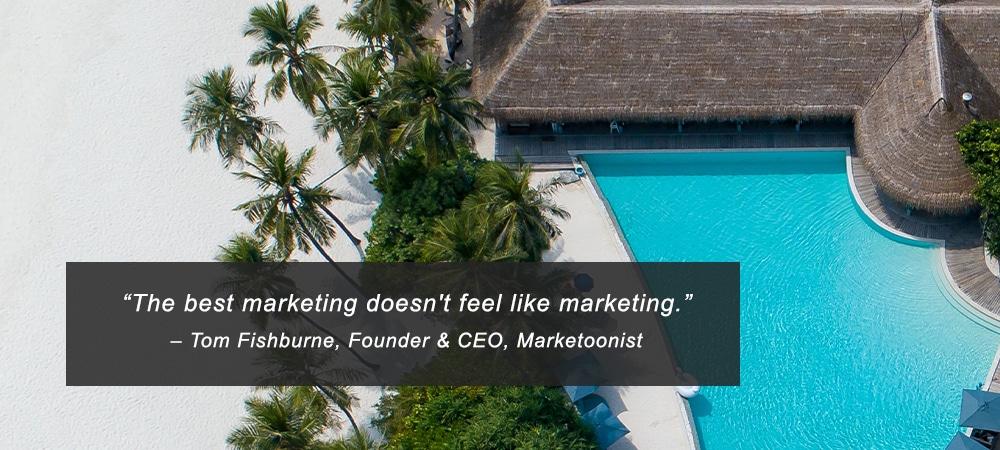A hotel marketing plan is important for establishing your marketing objectives, outlining how to achieve them, understanding your target audience(s), and pinpointing your unique selling proposition. In this article, you can learn more about how to create and continually modify your marketing plan.
Table of Contents:
- What is the Hotel Industry?
- What is a Hotel Marketing Plan?
- Why is a Hotel Marketing Plan Important?
- Hotel Business Plan: The Fundamental Step to Secure Hotel Financing
- 6 Hotel Marketing Plan Items to Include
- 5 Tips for a Successful Hotel Marketing Plan
- Understanding the Latest Hotel Marketing Trends
- Knowing Where to Sell Hotel Packages
What Is the Hotel Industry?
Before getting into the intricacies of a hotel marketing plan, it is useful to explore the hotel industry and how it is distinct from hospitality. As the name indicates, it is the industry surrounding hotels, but with hotel meaning any form of temporary guest accommodation offering overnight stays to paying customers.
In other words, based on most accepted definitions, the hotel industry contains hotels, holiday cottages, bed and breakfasts, motels, resorts, serviced apartments, inns, and more. The industry forms one section of the larger hospitality industry, including hotels, restaurants, bars, cafes, car rental services, and similar businesses.
In the “Hotel Industry: Everything You Need to Know About Hotels!” article, you will be able to dive deeper into the definition of the hotel industry and learn about the different accommodation types it covers.
What Is a Hotel Marketing Plan?
A hotel marketing plan is a business document or blueprint that outlines your marketing strategy and explains the business activities that will help you achieve your marketing objectives. It often forms part of a wider business plan and helps explain precisely how you intend to promote your business.
Your marketing plan should clearly state your goals, the current state of your marketing strategy, target audience(s), and what campaigns and marketing activities you are planning. It should also establish the metrics you intend to use to measure the success of your marketing strategy. The document can be continually amended over time.
Why Is a Hotel Marketing Plan Important?
Hotel marketing is a complex area, with the marketing department responsible for everything from conducting market research and identifying your unique selling proposition to creating advertising campaigns and using social media to promote your hotel. A hotel marketing plan helps to keep all efforts centered on achieving your goals.
A hotel business that uses multiple channels for marketing purposes is more likely to reach its target audience and build brand awareness. Having a plan can help ensure that the right activities are carried out. The plan can also outline the key performance indicators that matter most so that progress can be understood.
Furthermore, a marketing plan helps the hotel owner and senior executives, who may not be directly involved with marketing, understand what activities will take place and what they intend to achieve.
Hotel Business Plan: The Fundamental Step to Secure Hotel Financing
Your hotel marketing plan should form part of a wider hotel business plan, and this document is essential for setting out your objectives, overall vision, and business strategy.
Your business plan will be the key to securing hotel financing at the start of your business’s existence, or at crucial points throughout its life, such as when you want to expand your property. It has to be a professional document, featuring in-depth analysis, financial forecasts, and business projections.
Typically, your business plan should highlight the strengths and weaknesses of your business, the opportunities that exist for you, and the threats and competition you face. It should include key performance indicators, information about your hotel staff, and details of any plans to expand, add features, or otherwise change operations.
6 Hotel Marketing Plan Items to Include
The following sections outline six items you should include in your hotel marketing plan.
1. Clear Outline and Objectives
Your hotel marketing plan needs to clearly outline your overall vision, broad marketing strategy, and specific goals and objectives. Try to be as precise as possible about these objectives, why you have chosen them, and why they matter to your overall hotel marketing strategy.
Goals should also be measurable. Some common examples of measurable goals that work well within a hotel marketing plan include increasing the revenue your hotel generates, boosting brand awareness, attracting more direct bookings, expanding your social media presence, or increasing the number of corporate services you sell.
Table: Examples & Importance of Clear Hotel Marketing Plan Objectives
| Key Objectives | Importance | Examples |
|---|---|---|
| Increase Direct Bookings | Boosts revenue by reducing commission fees. Reduces dependency on third-party booking platforms. |
Implementing a user-friendly and mobile-responsive booking engine on the hotel’s website. Offering exclusive discounts for guests who book directly. |
| Enhance Guest Loyalty | Enhances guest lifetime value and profitability. Increases repeat visits and word-of-mouth recommendations. |
Creating a guest loyalty program with rewards for frequent stays. Offering complimentary upgrades to returning guests. |
| Improve Online Reputation | Influences potential guests’ booking decisions. Builds trust and credibility with online audiences. |
Encouraging satisfied guests to leave positive reviews on review sites. Responding promptly and professionally to guest feedback and concerns. |
| Increase Occupancy Rates | Maximizes revenue and profitability. Optimizes hotel resources and operations. |
Running targeted promotions during off-peak seasons. Using dynamic pricing strategies to adjust rates based on demand. |
2. Hotel Marketing Segmentation Analysis
A good hotel marketing plan will include a significant segmentation component, which means breaking down the market of possible hotel customers into smaller groups or segments based on shared traits. This allows you to tailor specific marketing messages to the market segments they will resonate with the most.
Segmentation is important for fully understanding customer-related hotel trends and where your hotel fits into the wider industry. It allows you to see different customer types’ competing needs and expectations. From there, your marketing efforts can be adjusted to cater to the various sections of the market.
3. Highlighting the Hotel USP
Hotel companies need a clear idea of what they can offer customers that other companies cannot. This means developing, cultivating, and promoting your unique selling proposition (USP). When creating your hotel marketing plan, think carefully about where your hotel succeeds – or has the potential to succeed – and what makes it stand out.
What should make customers turn to your hotel rather than one of your competitors? Do you offer unique services, hotel technology, or facilities? Is your customer service exceptional? Do you go above and beyond in terms of sustainability? Are your in-room items of higher quality than rivals? Are you more budget-friendly?
Once you understand your USP, it should take center stage in your hotel marketing efforts.
Video: Pan Pacific London’s Anne Golden on the hotel’s USP
4. Social Media Marketing Strategy
Social media is a major component of modern hotel marketing, so your hotel marketing plan must also give it appropriate attention. According to the Number of Global Social Network Users Report by Statista, the number of social media users worldwide is projected to be 5.85 billion by 2027. You need to think carefully about the image you want to project about your hotel and how you can achieve this through social media marketing. What tone of voice will you adopt? How can you make your social media content stand out? How will you encourage social media users to engage with your brand?
Think about the social media channels you want to use and which demographics you can reach. For example, TikTok’s user base skews much younger than Facebook’s. You should also tailor marketing content for each platform. Words can be effective on Twitter and Facebook, whereas Instagram is primarily suited for image-based content.
In the “Social Media Strategies For Hotels to Engage With Guests” article, you can learn more about leveraging social media for hotel marketing purposes and explore eight specific strategies.
5. Digital Marketing Channel Strategy
In today’s world, digital marketing is crucial, and having a presence across many different channels is essential. At the same time, your presence across these channels needs to be cohesive and consistent to avoid confusing people. Therefore, a high-quality digital marketing channel strategy is needed. In fact, according to the State of the Industry Report by RMS, 70.9% of travelers say online content influences their choice of where to stay.
Your hotel marketing plan must consider all the possible digital channels you will have a presence on. This can include your own website, which should be user-friendly, up-to-date, informative, and consistent with your branding. Your strategy should include search engine marketing, such as SEO search engine advertising and social media. A dedicated mobile app for many brands is also an extra digital channel.
6. Hotel Reputation Management
Hotel marketing is ultimately about optimizing your brand; reputation management is a substantial part of this process. In the modern age, guests have a louder voice than ever before. A single upset guest can potentially cause huge reputational damage with a scathing review that attracts engagement online.
Hotel reputation management involves all aspects of managing your reputation, especially with regard to online reviews. You need a clear strategy for responding to negative reviews or complaints, addressing valid concerns, taking honest feedback, and continually improving your offering. If you identify trends within reviews, you need to take steps to fix these issues and create positive review trends instead.
5 Tips for a Successful Hotel Marketing Plan
In the following sections, you can read five tips to help you create a successful hotel marketing plan.
1. Continuously Evaluate Your Marketing Plan
Your hotel marketing plan should not be a document you create and never really engage with again. It needs to be a living, breathing document you continuously evaluate and change. This means measuring your key performance indicators and evolving your plan as those metrics, your hotel operations, and the wider market evolve.
Try to identify the areas where your hotel marketing plan is working, as well as the areas where improvements could be made. It is important to avoid neglecting your plan or assuming everything is working well without actually measuring the performance of your different campaigns and marketing channels.
2. Use Forecasting for an Informed Strategy
Forecasting is an amazing hotel management tool and, when appropriate, should be used to inform your marketing strategy. Using data on your books, historical data, and publicly available market data, you can potentially anticipate periods of high demand, periods of low demand, and times when unique opportunities may present themselves.
This allows you to develop an optimized marketing strategy based on the realities you are likely to face. Good forecasting can also provide a vital competitive advantage, allowing you to take steps other hotels do not take or capitalize on opportunities other hotels did not anticipate.
3. Make Sure to Include Mobile Friendly Digital Marketing
Mobile optimization is at the heart of a good hotel marketing plan in the modern age because many customers now carry out searches, engage with brands, browse social media, or book travel through their smartphones. Make sure you always include mobile-friendly marketing content within your plans.
This could mean optimizing your website so the mobile experience is seamless, creating a mobile app with a mobile-friendly booking engine, using QR codes effectively, sending SMS messages, and more.
4. Utilize a SWOT Analysis for Clearer Strategies
A SWOT analysis is an analysis of the strengths, weaknesses, opportunities, and threats that exist for your business or business in general within your industry. It can serve as a key component of your hotel marketing plan and your entire business plan, bringing much-needed clarity to your hotel marketing strategy.
Understanding each component of a SWOT analysis allows you to create the right marketing strategy for your specific business. While experts can provide general advice, you need to understand what your own business is good at, its weaknesses, where there are opportunities, and what could threaten your success.
Video: Maximizing Hotel Marketing Strategy Through a Thorough Hotel SWOT Analysis | Hotel Marketing
5. Do Not Disregard SEO Strategies
Finally, your hotel marketing plan needs to include search engine optimization elements. Some hotels make the mistake of treating SEO like an afterthought. Still, it should form a key part of your marketing strategy because it can increase visibility, attract visitors to your website and generate direct bookings.
A high-quality content marketing strategy can aid your SEO efforts. The key here is to understand your target audience, produce great content that is appealing or useful to them, use keywords intelligently, and benefit from improving your rankings on search engine results pages. You can then use your website to create conversions.
Understanding the Latest Hotel Marketing Trends
Marketing is one of the most important hotel departments, and it is essential that the team stays fully up-to-date with the latest trends in their area of expertise. This includes everything from the use of artificial intelligence technology and the emergence of influencer marketing to the growth of the metaverse.
In the “Hotel Marketing; The Latest Trends in the Hotel Industry” article, you will learn about the major trends that are relevant to marketing and explore how they could form part of your hotel marketing plan.
Knowing Where to Sell Hotel Packages
Your hotel marketing plan goes hand-in-hand with your hotel distribution plan, so it is worth examining the possibilities in this area. In particular, you need to understand the options available to your hotel when it comes to selling different packages to the main segments of the market.
In the “Hotel Websites Where Hoteliers Can Sell Packages” article, you can access a breakdown of the main third-party websites to expand your reach and sell hotel package deals to customers.
Hotel Marketing Plan FAQs
Your hotel marketing plan is a major business document outlining your marketing strategy, goals, and intended activities. It should be treated as a living document, which can be amended as your circumstances change, and it should form part of a wider hotel business plan.
Did You Like This Article About a Hotel Marketing Plan?
You might also be interested in the following articles:
- Hospitality Business: How to Start a Successful Hospitality Company
- Hotel Budget Plan: Practical Budgeting Tips for Hoteliers
- Hotel Market Segmentation: Effective Tips & Strategies for Hoteliers
- Hotel Financing: Learn How to Finance Your Hotel Business
- Hotel Departments: Learn About All the 7 Sections of a Hotel
More Tips to Grow Your Business
Revfine.com is the leading knowledge platform for the hospitality and travel industry. Professionals use our insights, strategies, and actionable tips to get inspired, optimize revenue, innovate processes, and improve customer experience.Explore expert advice on management, marketing, revenue management, operations, software, and technology in our dedicated Hotel, Hospitality, and Travel & Tourism categories.
This article is written by:
Hi, I am Martijn Barten, founder of Revfine.com. With 20 years of experience in the hospitality industry, I specialize in optimizing revenue by combining revenue management with marketing strategies. I have successfully developed, implemented, and managed revenue management and marketing strategies for individual properties and multi-property portfolios.











Leave A Comment